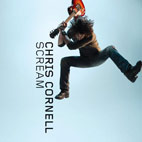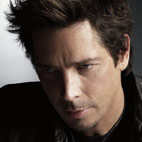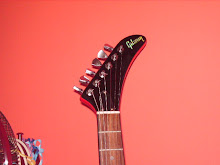Tuesday, April 7, 2009
Tuesday, March 24, 2009
Sunday, March 22, 2009
If you grew up listening to the groundbreaking grunge albums Louder Than Love or Badmotorfinger, you’re in for quite a shock. Chris Cornell, the vocalist who rose to fame with Soundgarden and experienced a similar success with Audioslave, has gone where few rockers dare: The world of electronic pop. Cornell’s 3rd solo album Scream has replaced the usual guitar-driven tunes of his past with tracks that are heavily based in dance beats and R&B grooves, a switch that undoubtedly was partially influenced by producer Timbaland (Justin Timberlake, M.I.A.).
It was evident during a recent interview with Cornell, however, that this is one musician who cannot be flustered easily. Rather than taking offense at the negative reviews, he has been looking at each comment analytically and sociologically. This is not an entertainer who is about to second-guess himself, particularly when he explained that his current live set (which includes a good batch of his old and new material) has made him the "happiest" he’s been in a good while. When Cornell talked with UG writer Amy Kelly, the singer’s time was quite limited, but he didn’t hesitate to provide our questions with candid, thorough responses – some of which might just have you thinking differently about Scream.
UG: Your new album Scream hit stores on March 10 and has already been evoking quite a bit commentary from critics and fans alike. When you pursued this project, were you prepared for the controversy that might develop by working with Timbaland?

"It’s not a simple album in terms of understanding what’s going on musically."
Having said that, I sort of expected controversy, and Timbaland expected it. He’s been through it obviously before. I think he really felt that it was going to come more so from my album than other people he worked with. When you’re rooted pretty much entirely in rock and you make a dramatic move – or what seems like a dramatic move like that – it’s going to ruffle some feathers. I’m really glad that it has, though. I would actually have been disappointed if it didn’t. It kind of came out and everybody was all smiles about it. It wouldn’t have been as interesting.
Now it’s like this sociological experiment. You get to look at the different statistics, as opposed to just what people are saying. It’s like, “Okay, this is what they’re saying, but who are they? Where are they from? How old are they? What country is it? What period of my career were they a fan of first?” There were a lot of different periods, and all those different periods had different kinds of music. All of that is really interesting. Even though I’m a guy who comes from what someone could easily say is the rock world, the music that is in that is very different. I’ve released and written a lot of songs that are very non-hard rock inside that world. So then it starts to come down to, “Oh, so it’s really more about guitars versus not guitars, or guitars versus lots of synths or dance beats.” It’s really interesting to look at it from all these different angles, and then try and come up with my understanding of why people are responding in some ways.
The really obvious ones are the most negativity and the most positivity. In other words, the most polarization is definitely in the U.S. Outside of the U.S., people are used to hearing remixes from every rock band. I mean there are Metallica remixes if you go to Ireland. They’re used to it. So it hasn’t been as polarized.
In the U.S., there is also that we’re a country that loves the underdog. There are people who will hear negative stuff, and they’ll come back with, “This is the best thing he’s ever done.” Even that is sort of tough in that I have to gauge, “Well, is this person saying that because they want to be encouraging or it’s because they really believe that?” Some of the comments that I hear from people I really believe. Other ones I feel like they may love the record or it may not be their favorite record, but they don’t like it when somebody gets picked on. So it’s all been pretty interesting.
I recall in past interviews that you’ve mentioned many of your songs start out in a rather traditional rock way – with a few chords from your guitar. So many of the tracks on Scream are beat-driven, which probably changed the entire songwriting process. How did you form the groundwork for most of the album? Did you concentrate on the percussion or vocal elements first?
Basically everything was beat-based. So Timbaland would kind of work from home on beat ideas one at a time. As he was doing that, he would bring them in. Sometimes he would do it in the studio and sometimes he would do it at his home studio. He would bring them into where I was, in the studio where I was working, and play them. Generally, it was like a 2-track, stereo file with his percussion and maybe like one other part already kind of mixed in there. I would write and sing all my parts over that. Some of them, like on the song “Ground Zero,” were actually nothing except drums and this one little keytar note that would sometimes not be there. So as you’ve just said, the vocal harmonies and the vocal melody dictated the key changes to the song. It was like writing a song entirely with just vocals, and other parts were added later.
In a song like “Never Far Away” or “Scream,” there would be much more lush music that we’d write, and it would have much more of an already-arranged-song feel. Working in the computer environment to this degree was different for me because a lot of the song arrangements kind of happened as we’d go. I would write down lyrics for what I felt was a song and sing the parts. When we were kind of figuring out what is the bridge, how many times should the chorus be, when it should come in, what should the length of the verse be, and all of it had been more or less arranged, Jeff would be in cyberspace versus a band standing there trying all the different ways to see how it sounds.

"Basically everything was beat-based."
I’ve had a hard time sometimes with demos as a vocalist because I want to sort of feel like I know how to sing the song and know what I’m doing. Sometimes there’s something sort of missing and in trying to find it, there’s something in there that’s more exciting. I’ve had producers over the years tell me that some of my demo performances were better. I used some of that on the album. There’s certainly a freshness to every vocal on it that’s not like something rehearsed or over-rehearsed.
I actually had to rehearse quite a bit once the album was finished. I just wanted to get used to performing the songs. I did the whole album at several shows on the tour, so I had to rehearse that. The main difference is that you were writing the song and recording the song at the same time.
In listening to Scream, I did have to wonder how you were planning to translate the album into a stage show. Are you going to add quite a few additional bandmates to your usual lineup?
I’ve done it where I had just keyboard players – 2 and then where I had 1. Basically what it is now is using some of the synth tracks and backing tracks and playing to those, and then having guitars sort of mimic synth parts and just replay those parts. Then the drums are just live and we’ll have sort of a reproduction of what’s recorded. That’s been the best way. There’s something about it, too, that it translates really well. The feeling of the song and the feeling of the album come through, but it’s also about a band playing. Therefore I can go in and out of new and old material pretty much effortlessly, and it’s not weird at all.
That was my only concern in this whole process. How am I going to bring this live and mix it up with my old material? Being able to do what I like to do, which is like a 2-and-a-half-hour set, how am I going to get in and out of it? I came up with a lot of ideas before I tried it. One was that I could do an acoustic set where I could just play lots of new music and mix it up. You can get in and out of anything with that. But when we started playing, not only was it not a problem, it’s actually become this huge bonus to the live show. It’s really dynamic and it’s a new level sonically and rhythmically. To me, it’s just kind of broadened my live set to where I’m the happiest that I’ve ever been.
You’re probably not looking too far ahead with the new album just being released, but have you reflected on your next possible move? Is it possible that you might even push the envelope further by exploring more new musical genres?
Yeah, I’ve already had a couple of ideas of what I would do next. At the time I’m focused on the album, so I can’t make any predictions – but I will take this experience me wherever I go.
Interview by Amy Kelly
Ultimate-Guitar.Com © 2009
Tuesday, March 3, 2009
Sunday, March 1, 2009
Dave Mustaine and Metallica Kiss and Make Up
Dave Mustaine and Metallica Kiss and Make Up
by Paul Cashmere - March 2 2009
photo by Ros O'Gorman
If you thought hell froze over when the Eagles got back together, well here is something for the devil to put his ski boots on again for. Dave Mustaine and Metallica are friends again.
Mustaine had a short stint in Metallica for two years from 1981.
Next month Metallica will be inducted into the Rock and Roll Hall of Fame and have buried the hatchet to invite Mustaine to join them.
He cannot, due to touring commitments, but published a letter to the band at his official website.
He says:
“Metallica, as you know has been selected to be inducted into the Rock and Roll Hall of Fame (on April 4th). So, it is with much respect that I say congratulations!
I also had the nice surprise of hearing that they called to invite me to the pre-ceremony party the night before, and then to the actual ceremony. Unfortunately as you all know, I will be winding down our European tour with Judas Priest so I will be unable to attend.
However, I’d like to say to Lars (Ulrich) and James (Hetfield), I am so very proud of all you have accomplished. I will continue to pray for the very best for you and your families as I always have.
Thank you for the invitation and thinking of me.
Respectfully yours,
Dave Mustaine”
Mustaine co-wrote four of the songs on ‘Kill Em All’ and two on ‘Ride The Lightning’. He claims to have written ‘Leper Messiah’ from Master of Puppets but is uncredited. He also claims it was his idea to turn the children’s song ‘Now I Lay Me Down To Sleep’ into a Metallica song. Years later they did just that with ‘Enter Sandman’.
Mustaine was fired from Metallica for his alcoholism and drug abuse that led to fights with James and Lars.
Supergroups
Mike Patton (Faith No More) -VOCALS
James Hetfield (Metallica) - Guitars
Stone Gossard ( Pearl Jam) - Guitars
Robert DeLeo (STP) - Bass
Dave Grohl (Foo Fighters/ Nirvana) - Drums
I dunno if this would work, but I have the right to fantasize don't I.
It will definetly be Rhythm heavy..
What's yours?




